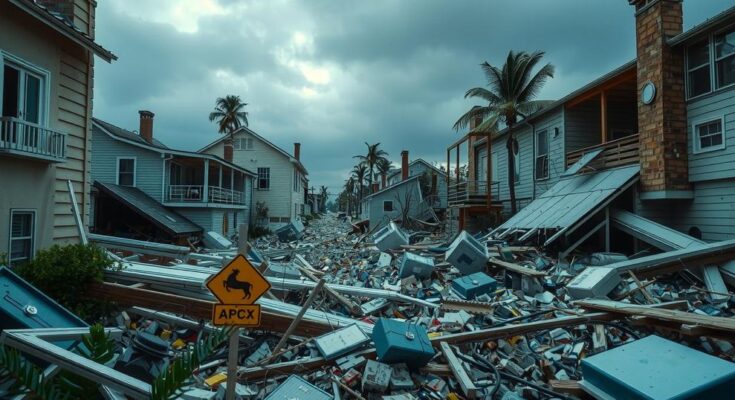The 2024 Atlantic hurricane season concluded with 11 hurricanes, notable for its early and late-season storms such as Hurricanes Beryl and Helene, resulting in catastrophic damage and significant loss of life, particularly in the southeastern U.S. Experts attribute the season’s intensity to unusually warm ocean temperatures exacerbated by climate change, underscoring the urgency to address environmental challenges.
The conclusion of the 2024 Atlantic hurricane season, marked on Saturday, has highlighted a year of extraordinary weather events, characterized by the formation of 11 hurricanes, surpassing the typical average of seven. This season inflicted considerable damage across extensive regions, particularly affecting areas far from where the storms initially made landfall along the U.S. Gulf Coast. Meteorologists described the season as exceptionally active, attributing its intensity to anomalously high ocean temperatures that served as a catalyst for storm activity.
Notably, Hurricane Beryl emerged as a groundbreaking storm, being the first Category 4 hurricane recorded in June, striking Carriacou in Grenada and subsequently wreaking havoc in Jamaica. The hurricane claimed two lives and caused significant destruction to agricultural lands. Beryl further intensified, becoming the first Category 5 hurricane recorded so early in the season, achieving this status on July 1—an occurrence not typically expected until after September 1.
September proved to be devastating with Hurricane Helene, which inflicted catastrophic damage, predominantly in the southeastern United States, marking itself as the deadliest storm on the mainland since Hurricane Katrina in 2005. With a staggering death toll exceeding 200, North Carolina reported damages of nearly $48.8 billion. Other states, including Florida, Georgia, South Carolina, Tennessee, and Virginia, also experienced severe destruction.
Further into the season, in October, Hurricane Milton rapidly intensified, reaching wind speeds of 180 mph, ranking among the strongest hurricanes recorded in the Gulf of Mexico. The post-hurricane period saw rainfall in affected areas peak at nearly triple the historical average for that time of year, leading to significant flooding in locations such as Asheville, Tampa, and Orlando.
In November, Hurricane Rafael closely approached historical records with maximum speeds of 120 mph, impacting Cuba while the nation was still working to recover from the damage inflicted by Hurricane Oscar the previous month. The cumulative impact of these storms directly correlates with the ongoing challenges posed by climate change, which is leading to more frequent and severe storms.
According to hurricane researcher Brian McNoldy from the University of Miami, climate change contributes significantly to the current weather patterns, although it is careful to note that it is essential not to attribute any individual storm solely to climate change.
“I do not ever point to climate change as causing a specific weather event, but it certainly has its finger on the scale and makes these extreme storms more likely to occur,” stated McNoldy, emphasizing the link between climate change and the unprecedented nature of the storms witnessed this season.
The Atlantic hurricane season typically spans from June 1 to November 30 each year, during which tropical cyclones form in the Atlantic Ocean. This season has been significantly impacted by rising global temperatures due to climate change, leading to increased hurricane intensity and frequency. The year 2024 witnessed unprecedented storm patterns, including early and late-season hurricanes that caused widespread devastation across several nations. Meteorological research indicates that warmer ocean waters amplify storm development, influencing both timing and impact.
In conclusion, the 2024 Atlantic hurricane season has underscored the increasing severity of climate-related weather events, culminating in record-breaking storm activity and extensive damage across multiple regions. With significant loss of life and economic devastation, the season serves as a stark reminder of the growing challenges posed by climate change. As emphasized by experts, addressing the implications of a warming planet is essential to mitigate the repercussions of future hurricane seasons.
Original Source: www.wtvr.com




